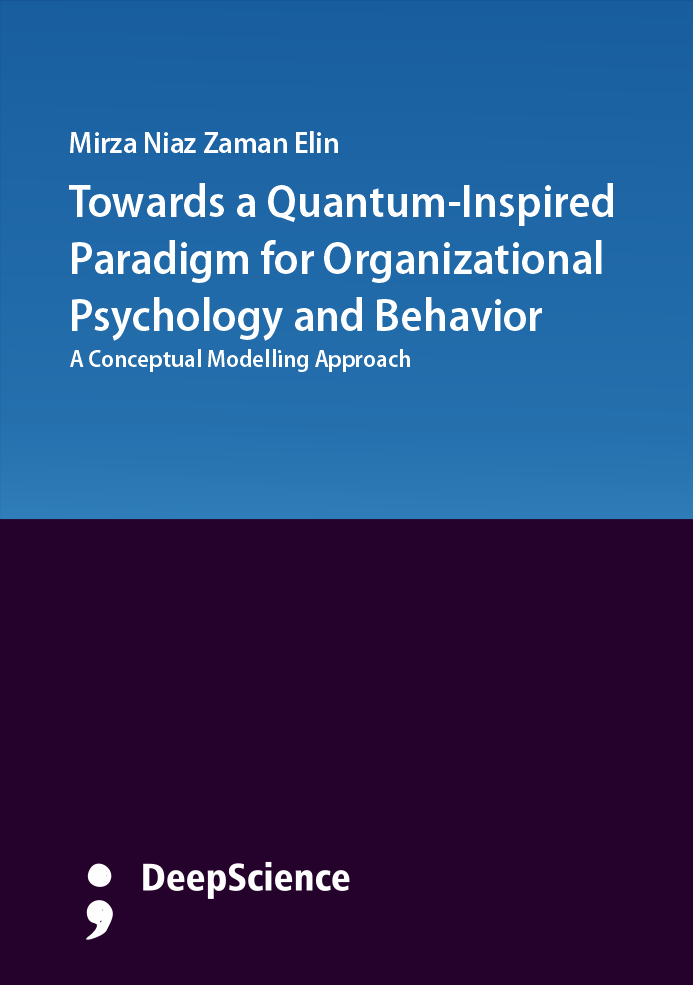Towards a Quantum-Inspired Paradigm for Organizational Psychology and Behavior: A Conceptual Modelling Approach
Keywords:
Quantum Psychology, Entanglement, Superposition, Psychometrics, Organizational Behavior, Organizational Change Management, Job SatisfactionSynopsis
Organizational phenomena are traditionally investigated within the frameworks of classical psychology and psychometrics, focusing on the measurement of constructs, such as competence, job satisfaction, or agreement, as independent or linearly related constructs. But organizational life is often paradoxical: the leader with high decision-making ability but low job satisfaction, or the staff with strong agreement but divergent results, or the mixture of concertation and disconnections within different groups. Such non-classical dynamics are not amenable to ordinary models. This article proposes Organizational Quantum Psychometric Modelling (OQPM), a quantum-inspired approach to re-imagining the measurement and understanding of the behavior of organizations. Lending from quantum theory, in particular, entanglement, superposition, and synchronization, OQPM argues that leader-staff relations can be modeled as coupled systems in which none of these three states are simply correlated, but are in some sense interdependent in ways that defy classical logic. OQPM posits that the organizational features are in “superposed” states until relational contexts decohere them into observed realizations and that their entangled states account for puzzling results where one group’s strengths are systematically combined with the other’s weaknesses. OQPM is an attempt to view psychometric constructs through a lens of quantum for a richer portrayal of variance, ambiguity, and connectedness in organizational life. This paradigm unlocks possibilities for new metrics, statistical predictive models, and empirical research that can breathe new life into both organizational psychology and leadership studies with the hope that it could plant the early seeds of the field of Organizational Quantum Psychology.
References
Schein, E. H. (2015). Organizational psychology then and now: Some observations. Annual Review of Organizational Psychology and Organizational Behavior, 2, 1–19. https://doi.org/10.1146/annurev-orgpsych-032414-111449
Rafacz S. D. (2019). Review of Organizational Behavior Management: The Essentials, edited by Byron Wine and Joshua K. Pritchard: 2018; Orlando, FL: Hedgehog Publishers. Perspectives on Behavior Science, 42(4), 987–997. https://doi.org/10.1007/s40614-019-00236-9
Cappelleri, J. C., Jason Lundy, J., & Hays, R. D. (2014). Overview of classical test theory and item response theory for the quantitative assessment of items in developing patient-reported outcomes measures. Clinical therapeutics, 36(5), 648–662. https://doi.org/10.1016/j.clinthera.2014.04.006
Aerts, D., D’Hooghe, B., & Haven, E. (2010). Quantum experimental data in psychology and economics. International Journal of Theoretical Physics, 49(12), 2971–2990. https://doi.org/10.1007/s10773-010-0477-0
Haven, E., Khrennikov, A., Ma, C., & Sozzo, S. (2018). Introduction to quantum probability theory and its economic applications. Journal of Mathematical Economics, 78, 150–157. https://doi.org/10.1016/j.jmateco.2018.08.004
Haven, E., & Khrennikov, A. (2013). Quantum probability and the mathematical modelling of decision-making. Cambridge University Press. https://doi.org/10.1017/CBO9781139003227
Wang, Z., Busemeyer, J. R., Atmanspacher, H., & Pothos, E. M. (2013). The potential of using quantum theory to build models of cognition. Topics in Cognitive Science, 5(4), 672–688. https://doi.org/10.1111/tops.12043













